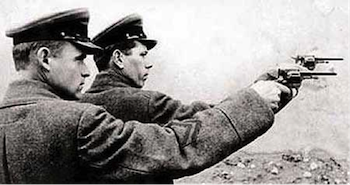This section covers the years of the Great Terror in 1937-1938. We will be exploring the origins of the Stalinist terror - asking whether it was rooted in the Bolsheviks Revolution from the start or in Stalin's fears during the 1930s? Why were so many people killed? How did the mass terror spread? Why did so few in the system oppose it? What did ordinary people make of the arrests? How did they relate to arrested friends and relatives? How and why did the Great Terror stop? And what were its legacies for the Soviet system? The section contains extracts from my books, photographs and a video, and my recommended reading list. Register here to get information on accessing more materials including my responses to exam questions on these themes.

NKVD officers firing Nagant revolvers
Terror was central to Lenin's revolution from the start. The Bolshevik leader had always accepted the need for organized violence to establish and defend 'the dictatorship of the proletariat'. Read more...
there were several 'show trials' during 1936-38. Their aim was to expose a coordinated ring of 'spies' and 'terrorists' organized by former oppositionists. Read more...
When a Party leader was arrested, everybody in his social orbit came under suspicion. Read more...
Informers were everywhere - in factories and offices, in public places and communal apartments. Read more...
The vast majority of Great Terror's victims were not Party members and their associates but ordinary citizens. They were the victims of the mass operations against 'kulaks' and nationalities between August 1937 and November 1938. Read more...
The thinking behind these mass repressions is suggested in the stenographic record of the Central Committee Plenum of February-March 1937. Read more...
People lived in fearful expectation of the knock on the door in the middle of the night. They slept badly and awoke when they heard a car pull up outside. Read more...
The sudden disappearance of so many 'enemies' beggared belief. How could such a large number of trusted Party members - heroes of the Revolution and the Civil War - turn out to have been hidden 'enemies'? Read more...
At the rate the arrests were going on, it would not be long before the country broke down. The Party would be undermined - no one would believe it - unless the mass arrests came to an end. Read more...
The Great Terror had a deep and lasting impact on Soviet society. Millions of families were damaged or destroyed. Relationships were lost. Children grew up without fathers, with mothers broken by the camps. Read more...
Here are some exam-like questions. Read more...
A recording of a lecture/class about these themes using primary documents. Read more...
A list of further reading. Read more...

